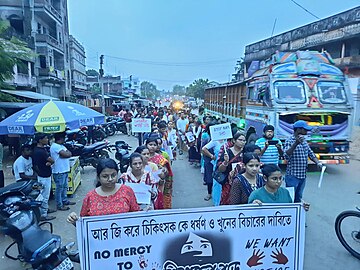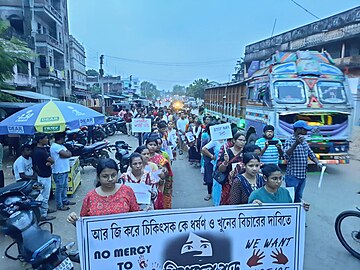
The Indian Medical Association (IMA) has taken a decisive step in response to the horrific rape and murder of a 31-year-old trainee doctor at Kolkata’s RG Kar Medical College, declaring a nationwide halt of medical services for 24 hours starting at 6 a.m. on Saturday, August 17, 2024. This strike is a powerful protest against the brutality that the young doctor faced and the subsequent vandalism at the hospital that left many medical staff in fear for their lives.
The Incident and Its Aftermath Kolkata doctor rape case
The incident in Kolkata has sent shockwaves across the country. The trainee doctor was found murdered on the premises of the medical college, and evidence suggested that she had been sexually assaulted before her death. The crime occurred in what should have been a safe environment, prompting outrage not only within the medical community but also among the general public.
Adding fuel to the fire, a mob descended on the hospital following the discovery of the crime. Claiming to be protesting the incident, the mob vandalized the hospital’s emergency ward, causing widespread panic. Doctors and medical staff were forced to hide as the situation escalated, with the police eventually resorting to tear gas and lathi charges to disperse the crowd.
This violence against healthcare professionals, combined with the initial crime, has led to an unprecedented response from the IMA.
The IMA’s Decision to Strike Kolkata doctor rape case
The IMA, which represents over 3.5 lakh doctors across India, announced that all routine outpatient department (OPD) services and elective surgeries would be suspended for 24 hours nationwide. The strike, while sparing emergency services, is expected to cause significant disruptions in medical care, particularly in government and private hospitals that are key providers of routine healthcare services.
The decision to strike was not taken lightly. The IMA has called for this action as a way to draw attention to the urgent need for better protection of healthcare workers. The association has demanded that the government declare hospitals as “safe zones” and implement a Central Protection Act specifically designed to safeguard healthcare workers from such violence. These demands underscore the growing frustration within the medical community over repeated instances of violence against doctors and hospital staff, a trend that has seen little action from authorities despite numerous incidents over the years.
Reactions and Support Kolkata doctor rape case
The response to the IMA’s call for a strike has been overwhelmingly supportive within the medical community. Resident doctors, junior doctors, and medical students have been at the forefront of protests, holding candlelight vigils, marches, and other demonstrations to demand justice for their fallen colleague and better protection for all healthcare workers.
The strike has also resonated beyond India’s borders, with demonstrations and shows of solidarity appearing as far away as Times Square in New York. This international attention has added pressure on Indian authorities to address the issue with the seriousness it deserves.
However, the strike has also raised concerns about the impact on patients who rely on routine medical services. The IMA has clarified that while the strike is necessary to bring attention to the dire situation, it is also designed to ensure that emergency care remains unaffected. This balance reflects the medical community’s commitment to patient care, even as they fight for their own safety and rights.
Government and Public Response Kolkata doctor rape case
In the wake of the incident and the IMA’s announcement, the West Bengal government, led by Chief Minister Mamata Banerjee, has been under intense scrutiny. The government has promised a thorough investigation into the rape and murder case, and several arrests have already been made. However, the medical community’s demands go beyond just this one case—they are calling for systemic changes to ensure such incidents do not happen again.
The public, too, has been largely supportive of the doctors’ cause, with many expressing outrage over the fact that a place meant for healing could become the site of such a heinous crime. Social media has been flooded with messages of support for the medical community, and there is a growing chorus for stronger laws to protect healthcare workers.
Table of Contents
Broader Implications
The IMA’s decision to halt services nationwide is a significant escalation in the ongoing struggle to secure better protections for healthcare professionals in India. The strike is not just about this one tragic incident—it is a statement about the need for systemic change. The medical community is demanding that the government take immediate and meaningful action to ensure the safety of those who dedicate their lives to caring for others.
This strike could have far-reaching consequences, both for the healthcare system and for how such crimes are handled in the future. If the government responds with concrete measures, it could set a precedent for improved security in hospitals across the country. Conversely, if the response is seen as inadequate, it could lead to further unrest and even more drastic actions from the medical community.
Conclusion
As the 24-hour strike looms, the focus remains on whether this collective action will spur the government into enacting the changes that the medical community so desperately needs. The IMA’s decision to halt services is a sobering reminder of the risks that healthcare workers face and the urgent need to protect them. The outcome of this protest could determine the future of healthcare safety in India and set the tone for how the country addresses violence against those who serve on the front lines of medical care.








